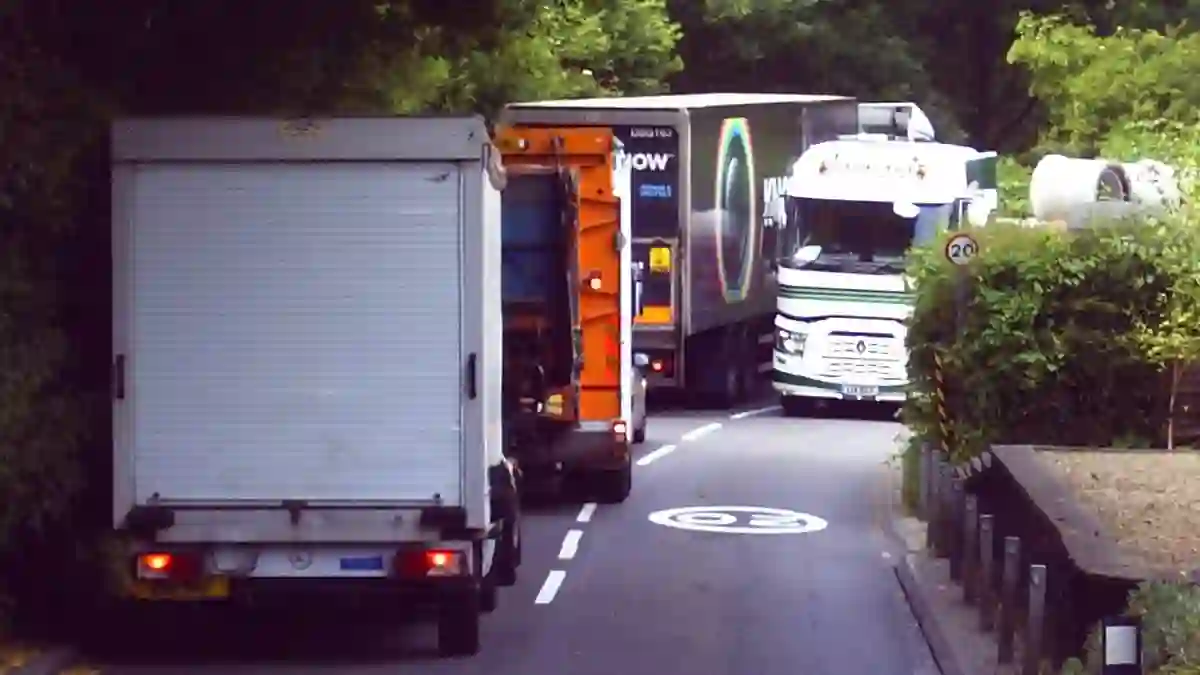In the heart of rural Dorset, the peaceful village of Melbury Abbas is facing an ongoing battle with something you wouldn’t expect in the countryside—traffic jams, heavy goods vehicles (HGVs), and now, a looming landslide risk.
Residents say their home has turned into a dangerous thoroughfare, and they’re blaming poor planning for an environmental mess that could cost £8 million to fix.
Dinah’s Hollow: A Charming Lane Turned Danger Zone
The problem centers around Dinah’s Hollow, a steep and narrow stretch of the C13 road that cuts through the village.
Once a quiet tree-lined route, it’s now become infamous for gridlocked trucks and crumbling embankments.
Villagers say this road, which was never meant to carry large lorries, has become a traffic hotspot due to diversions from the nearby A350.
With tight bends and one-way traffic controlled by lights, Dinah’s Hollow regularly sees HGVs get stuck—or worse.
One local even recalled how a lorry lost control and crashed through 100 feet of his garden hedge.
Locals Point Fingers at Lorries
Melbury Abbas residents are clear about what they think is causing the problem: the lorries.
For more than ten years, they’ve been forced to watch truck after truck rumble through their narrow lanes, creating noise, vibrations, and damage.
Vice chairman of the local parish council, Derek Coombes, summed up their frustration: “They should leave the bloody road alone and send the HGVs onto the A350. We’re seeing over 700 vehicles an hour, and it’s chaos.”
Coombes believes the embankment wouldn’t even need repair if the road hadn’t been turned into an unofficial HGV route.
£8 Million Fix Sparks Anger and Environmental Concerns
Dorset Council has now announced a major £8 million project to stabilize the embankment, saying it’s at risk of collapsing and potentially crushing vehicles below.
The plan includes cutting down almost 1,000 trees, installing steel nails into the slope, and spraying chemicals to stop vegetation from regrowing.
Before any of that work can begin, the road has been shut for five days while specialists conduct a bat survey of the trees.
That move, too, has sparked ridicule.
“People are trying to count bats in the daytime. It’s a joke,” Coombes said.
Wildlife and Villagers Both at Risk?
The environmental impact hasn’t gone unnoticed.
Local resident Tamsin Reynolds took to social media to voice her outrage: “So all the wildlife will be poisoned with the chemicals they’re using, and the land flattened. It’s bloody disgusting.”
Many villagers feel they’ve been punished for decisions made higher up, especially after the council removed a weight restriction for the road, allowing lorries to pour in.
Some say the village is being made a scapegoat.
Council Defends the Decision
Despite the backlash, Dorset Council is standing firm.
A spokesperson stated that heavy vehicles aren’t the reason for the unstable slope, pointing instead to rainfall and groundwater as the main culprits.
According to engineering assessments presented during a recent public inquiry, vibrations from lorries are rarely the cause of landslips in the UK.
The council insists the new slope-reinforcement plan—which includes “soil nailing”—will help prevent any future collapse, even with HGVs continuing to use the road.
Legal and Safety Pressure Mounts
Local councillor Jane Somper also weighed in, saying the council had no choice but to act.
“If something happened and we hadn’t intervened, there could be a corporate manslaughter case,” she warned.
Transferring ownership of the roadside land to the council also means local landowners won’t be held liable if disaster strikes.
One Village, Too Many Trucks
Just a mile away from Britain’s famously twisty Zig Zag Hill, Melbury Abbas has become a cautionary tale of what happens when infrastructure and planning don’t match up with real-world traffic.
Residents now hope for a common-sense compromise: an unofficial one-way system where northbound HGVs are kept on the A-road, giving their village some much-needed peace—and safety—back.

